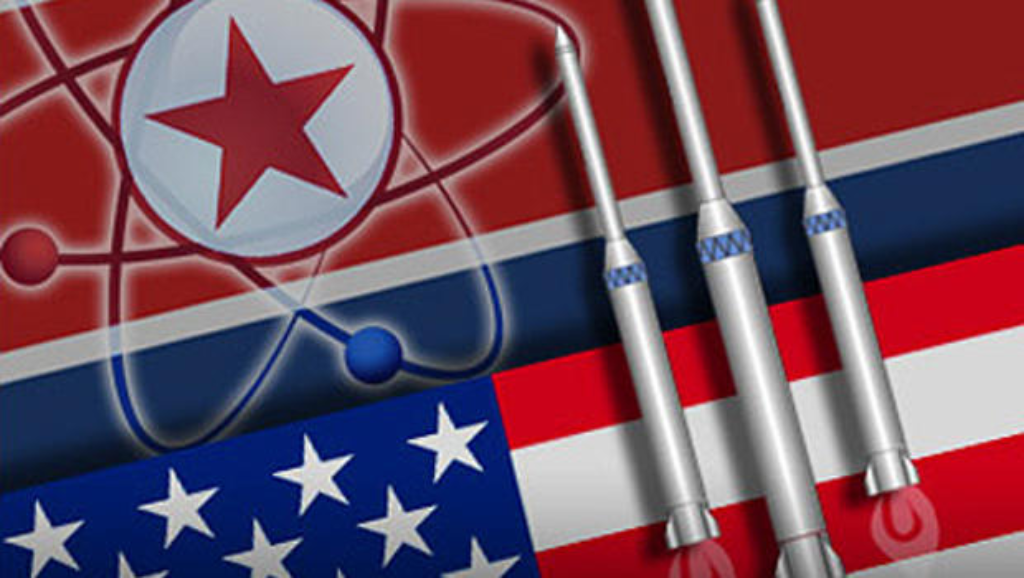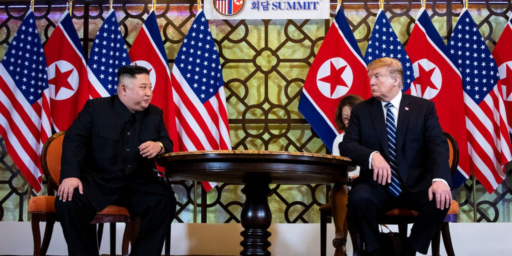New Year Likely To Bring A “Gift” From North Korea
The DPRK is promising a "gift" to the United States. The only question seems to be what form it will take.

NBC News reports that North Korea is expanding a factory it has used in the production of long-range ballistic missiles that could be capable reaching much of the Continental United States, a report that comes at the same time that the regime has been promising an end-of-the-year “gift” for the United States:
North Korea has expanded a factory linked to the production of long-range nuclear missiles, according to a new analysis of satellite photos provided to NBC News that bolsters a growing expectation the country soon will resume testing a capability that threatens the United States.
Commercial satellite images from Planet Labs show a temporary structure at the site to accommodate the raising of a launcher arm, according to Jeffrey Lewis, director of the East Asia Nonproliferation Program at the Middlebury Institute of International Studies.
“We believe North Korea erects this structure when the facility is involved in producing or modifying ICBM launchers,” Lewis concluded in a written analysis, using the acronym for intercontinental ballistic missiles.
The country halted nuclear and long-range missiles tests in 2017 in the wake of diplomatic talks with the United States that included two summit meetings between Kim and Trump. But in recent months no progress has been apparent.
“What I would expect is some kind of long-range ballistic missile would be the ‘gift,'” Gen. Charles Brown, head of Pacific Air Forces, told reporters Dec. 17. “Does it come on Christmas Eve? Does it come on Christmas Day? Does it come after the new year? One of my responsibilities is to pay attention to that.”
The Air Force will be prepared to respond to a missile launch, Brown said, without being specific. “There’s a lot of stuff we did in 2017 that we can dust off fairly quickly and be ready to use,” he said.
The facility flagged by Lewis and his team is known as the March 16 Factory, and it produces both military and civilian vehicles. Russian truck maker KamAZ began participating in a joint venture at the facility to produce to produce civilian vehicles from November 2006 to 2010, Lewis said.
(…)
“An expansion of the plant increases its capability to produce trucks for both civilian and military use,” Lewis wrote. “Until now, North Korea’s limited ability to produce heavy-duty vehicle chassis has been a constraint on the development of a survivable intercontinental-range ballistic missile program. The expansion of this facility may represent an increase in North Korea’s ability to produce domestic missile launchers and expand it ICBM force.”
When North Korea conducted a series of long-range missile tests in 2017, Trump threatened the nation with “fire and fury.” If it resumes the tests, Trump will find himself, as every recent president has, with no palatable choices. A military strike against the North risks a war that could cost hundreds of thousands of South Korean lives.
“The only option is to accept the reality that North Korea is a nuclear-armed state that holds the U.S. at risk,” Lewis said. “The Trump administration had an opportunity, and I think they’ve blown it.”
CNN meanwhile is reporting that the “gift” could be in the form of increased tensions on the Korean Peninsula after two years of relatively amicable relations between North and South and at least the veneer of diplomacy between Pyongyang and Washington:
North Korea is planning to adopt a hard-line policy toward the United States that involves taking denuclearization off the table amid perceptions that President Donald Trump is vulnerable politically, a source familiar with the North Korean leadership’s current mindset told CNN.
The source said this new policy is likely the so-called “Christmas gift” floated by a top North Korean official earlier this month. It is expected to include abandoning negotiations with Washington and consolidating Pyongyang’s status as a nuclear weapons state.
Pyongyang will also no longer pursue sanctions relief as a means of achieving economic development either in the short-term or long-term, but will instead increase its commitment to the state’s ideology of self-reliance, known as Juche.North Korean leader Kim Jong Un announced in 2018 that North Korea had “completed” its quest to develop nuclear weapons and vowed to fully focus the country’s efforts on economic development and improving the livelihood of his people.
It’s unclear how Trump and his administration would respond to such a decision. After Trump took office in 2017, he and Kim sparred verbally as North Korea test-fired a bevy of increasingly advanced ballistic missiles, the type designed to deliver nuclear warheads.
A flurry of diplomacy that included three in-person meetings between Trump and Kim followed, but working-level negotiations have not made much progress. As the clock has ticked closer to an end-of-year deadline for talks imposed by the North Koreans, the rhetoric on each side has taken on some of the vitriol of 2017.
The source said that Kim is expected to take a “wait and see” approach. This is based on the perception that Trump is politically vulnerable due to his impeachment and the looming 2020 presidential election.
Analysts believe Pyongyang is worried that if it does cut a deal with Trump and he loses in November, his successor may not uphold the accord. North Korea and the United States have reached previous agreements that did not survive successive administrations, and more recently Kim’s diplomats have been quick to cite the Trump administration’s decision to abandon a nuclear deal with Iran as a reason it can’t trust the United States to commit to a long-term accord.
If Trump does win a second term, the North Koreans may be more willing to reengage, the source said. But the bar has definitely been raised for returning to talks with Washington.
Denuclearization, the source said, appears to be off the table for now.
Of course, as I’ve noted before ”denuclearization” in the context of the talks between the United States has always been something of an ambiguous term. This is largely due to the fact that the American position in talks with North Korea ignores the fact that the United States and North Korea have fundamentally different ideas of what “denuclearization” means.
For the United States, it essentially means that the North Koreans would give up their nuclear weapons, their ballistic missile technology, and their research programs in both areas. In exchange, it appears that the United States has made what seem to be vague at best promises about sanctions relief and the grandiose promises that President Trump has made about the benefits that would result from to the North Korean economy if it opened itself to the world even though there’s no indication that Kim Jong Un or the leadership in Pyongyang want that kind of future for their country.
When the North Koreans talk about “denuclearization,” though, they speak of the “denuclearization of the Korean Peninsula.” This means not only some action on the part of the North Koreans but also the understanding that the United States would remove any nuclear weapons it may have in the region and that it would renounce the idea of providing South Korea and Japan with a “nuclear umbrella,” which is essentially the threat that any attack on an American ally. It is also fairly clear that the North Koreans also include in their definition of “denuclearization” the idea that the American military presence in South Korea, and potentially in Japan, which the DPRK has made clear it considers to be part of the nuclear threat posed by the United States.
Based on the realities on the ground, this difference in the understand of what “denuclearization” means to each side makes sense given the fact that, as I have said before, the history of the past twenty years or so makes it clear that Kim would be a fool to completely give up either his nuclear weapons or the research program, and to understand why, one need only look to the examples of Libya, Iraq, and other nations that have pursued a nuclear weapons program and the different ways that they have been treated.
The CNN report also suggests that analysts believe that the reported year-end “gift” is not likely to include a missile test:
Experts and analysts have speculated that the “Christmas gift” warning could portend some sort of advanced missile launch or satellite test, actions that would likely necessitate a response from the US and other global powers.
Recent commercial satellite photographs appear to show activity at North Korea’s Sohae satellite launch facility and another site linked to the production of intercontinental-range ballistic missiles (ICBMs).
However, the chances are “very low” that North Korea will actually conduct a provocative test like a satellite launch, firing an ICBM, or detonating a nuclear weapon, because those acts would be considered too provocative for the likes of China and Russia, Pyongyang’s two most important international trading partners, the source said.
Both nations have historical ties to North Korea. China, in particular, is believed to account for almost 90% of North Korea’s imports — a vital lifeline for Pyongyang.
Backdoor supply lines from China and Russia are beginning to reopen, the source said, and the North Koreans are aware that something its most important economic partners view as too extreme could alienate them.
Analysts say while China and Russia want North Korea to give up its nuclear weapons and ballistic missiles, their number one priority is stability on the Korean Peninsula.
Moscow and Beijing have in the past been willing to punish North Korea for its nuclear weapons program development. Both countries approved the punishing international sanctions levied on Pyongyang in 2017 in response to its various missile and nuclear tests.
The source said recent engine tests at the Sohae site helped North Korean scientists “gain valuable knowledge,” but did not cross a red line that would damage relations with China and Russia.
Additionally, as the CNN piece goes on to acknowledge, taking an aggressive step like conducting a ballistic missile test or another nuclear test, something which most experts believe to unnecessary at this point, will antagonize relations with both the United States and with South Korea. Such as move is also likely to push the United States, South Korea, and Japan closer together at a time when rifts in those relationships appear to be growing thanks to the actions and rhetoric of the Trump Administration.
As noted, the deadline that North Korea has set expires at the end of the year and it’s not clear exactly what we can expect to see from the DPRK. Whatever it is, though, it will show the world that the Trump Administration’s brain dead policy toward North Korea has been an abject failure.





No more love letters between Kim and Trump, one supposes. Didn’t Trump swear that he’d ended this threat?
It should surprise no one that scrapping the Iran deal bites the US in the ass. It’s crazy how bad the GOP is at everything.
By cancelling the annual war games in Korea, Trump not only gave the North Koreans something they wanted, but gave the US a medium-sized stick to respond to North Korean nuclear weapon and ballistic missile testing. I don’t think it was a clever bit of planning, but it works out.
I would hope that we have informed the North Koreans that we will be resuming the war games if they resume the testing. And that we might start doing it twice a year, to practice in poor weather.
Whatever the “gift” is won’t sway the Trumpkins and probably not those college educated suburban repugs who are considering voting for the Dem. Nothing short of a shooting war will get their attention.
The only people paying attention are security wonks and political junkies on the left and right. And we’re too few to make any difference.
What’s the fury level vis-s-vis Hell of a Cheeto scorned?
The nightmare isn’t an all out bombardment of Seoul, or nukes dropped on South Korea and Japan (on US bases). after all, should Kim try that, he knows his hermit kingdom will glow in the dark for the next thousand years.
No, the nightmare is a limited incursion along the DMZ, or even an all-out invasion to conquer the South. There’d be no reason to nuke Kim in return. There would be hesitation to intervene, lest Kim nuke Japan, or Guam, or even a city in America’s west coast.
America has never fought an adversary armed with nukes (China didn’t get any until the 60s, if memory serves). The strategic calculus changes radically, as does the tactical one. Remember the scenarios regarding chemical weapons in the Gulf War in 1991?
This is all well above the Cheeto’s pay grade.
@Kathy:
Which is why Iran pursued nukes and will again.
Properly handling his Twitter account is above his pay grade…
@Kathy:
No, it isn’t. Cheeto, however, doesn’t rise to his pay grade.
At the risk of raining on everyone here’s parade of Trump animus, I would like to note seriously that NK deciding to “fully focus the country’s efforts on economic development and improving the livelihood of his people” would truly be a gift to the entire world–not the least to the people of North Korea itself. If there were anything that Trump or anyone else could do to encourage a move in that direction, it would be an effort well made.
I don’t see how such a focus can happen within the context of Juche, but I have an open mind and am willing to cheer any effort or progress made to improve the lives of people anywhere–NK included.
But an ICBM test, announcement of further miniaturization of warheads, or a test explosion is what I’m suspecting is the “gift.” To the best of my knowledge, a large scale attack on South Korea would still be an act of suicide for Kim, so that would surprise me. Actually, any attack on South Korea would be a surprise (which, sadly, makes it a possibility) because resolve to respond to Kim in kind is strong in South Korea even though Moon Jae-in is President. Perhaps even because Moon is the leader.